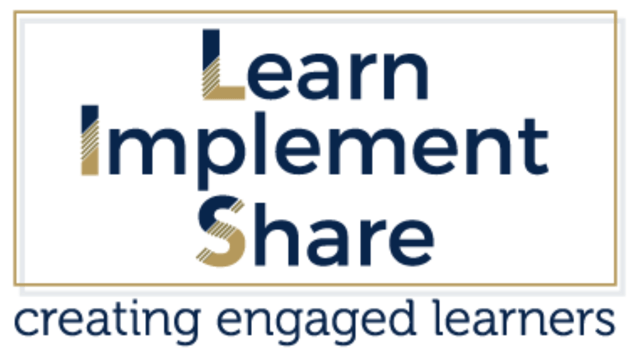School Leaders:
How To Improve Your Pedagogical Influence With Your Teachers
The Case For Leading A TEAM Professional Learning Experience
Wanting to have an impact!During my six-year stint as a Head of Department (HoD), the number one outcome I wanted to achieve was to have pedagogical influence with my mathematics staff. Not that I wanted to dictate the way they should teach. Rather, I wanted to establish a culture in which we all questioned the approaches we used, workshopped how to increase agency in students, implemented new ideas, and shared our pedagogical wins and losses.
Of course, this never occurred. This was, in part, due to a lack of time. Mostly, however, it never happened because I lacked the necessary credibility required to exercise pedagogical influence. Sure, I was well respected and liked as a HoD and cultivated a healthy level of cohesion in the team. BUT - and this is a big ‘BUT’ - as a HoD I was not seen as someone who had any particular pedagogical expertise to impart. I simply lacked pedagogical influence. |
I find this particularly ironic because having left the role as HoD many years ago and having devoted my professional time since to running pedagogically-based courses for teachers, it is obvious I now influence teachers pedagogically. (And I often don't get to meet, in person, the teachers!)
The difference in pedagogical influence between being a HoD and being a PD Provider lies with expectation - in a PD program, the expectation is that I will have pedagogical influence; as a HoD, that I won't.
The difference in pedagogical influence between being a HoD and being a PD Provider lies with expectation - in a PD program, the expectation is that I will have pedagogical influence; as a HoD, that I won't.
Why the lack of pedagogical influence?
I have spoken to many HoDs about this issue, and most concur with my experience. The common consensus appears to be that teachers tend to lack an openness to taking pedagogical advice from their HoD - “I'll listen to your suggestions, but I'm not open to changing to your ideas!"
Sure, some school leaders earn themselves significant pedagogical influence. However, this tends to be the exception rather than the rule.
I'm not suggesting that teacher resistance to a leader's pedagogical suggestions is necessarily intentional or conscious. Simply put, if I’m a teacher then I’m likely to have a mindset towards my HoD of “Lead me through the logistics of being a teacher but don’t try to tell me how to teach.”
However, let's be clear. I'm not referring to the leader who strives for pedagogical change through an attitude of 'You will teach my way'. Rather, we need to 'Lead our horses to cool, inviting water'.
Sure, some school leaders earn themselves significant pedagogical influence. However, this tends to be the exception rather than the rule.
I'm not suggesting that teacher resistance to a leader's pedagogical suggestions is necessarily intentional or conscious. Simply put, if I’m a teacher then I’m likely to have a mindset towards my HoD of “Lead me through the logistics of being a teacher but don’t try to tell me how to teach.”
However, let's be clear. I'm not referring to the leader who strives for pedagogical change through an attitude of 'You will teach my way'. Rather, we need to 'Lead our horses to cool, inviting water'.
The collective wisdom model
I am aware of the default collaborative PD model that uses only the collective wisdom of teachers to raise the pedagogy among the collective and where the leader's role is only to facilitate.
This is all well and good, but what if, for example, there isn't anyone using strategies designed to increase student ownership of learning within the teacher collective? Or, in the mathematics context, for example, what if the collective wisdom is not aligned to an Understanding-first, Procedures-second mindset, i.e. not aligned to having students explore and understand mathematical concepts before encountering the related procedures?
Sometimes teachers need a pedagogical framework before best expressing their collective creativity. Sometimes, that pedagogical framework needs to come from outside the collective.
The conundrum is, therefore, that leaders require a level of pedagogical influence and yet the default position of teachers is to be closed to that influence.
This is all well and good, but what if, for example, there isn't anyone using strategies designed to increase student ownership of learning within the teacher collective? Or, in the mathematics context, for example, what if the collective wisdom is not aligned to an Understanding-first, Procedures-second mindset, i.e. not aligned to having students explore and understand mathematical concepts before encountering the related procedures?
Sometimes teachers need a pedagogical framework before best expressing their collective creativity. Sometimes, that pedagogical framework needs to come from outside the collective.
The conundrum is, therefore, that leaders require a level of pedagogical influence and yet the default position of teachers is to be closed to that influence.
An effective way forward for school leadersIf you are a leader seeking to improve your level of pedagogical influence, then consider this suggested pathway from Learn Implement Share, (or a provider offering a Team-based program with similar outcomes.)
Here's how our Team Program works:
|
Jeff Mills and I chat about pedagogical influence and the Team PD Model
|
- Work through the content with your team either in a self-paced manner or by utilising Team sessions at school, or both.
- You will be the facilitator of learning (Team Leader) for your Team. The Learn Implement Share presenter will support you in your onsite role.
- Your Team Leader role involves working through the program with your teachers, encouraging collaboration within your Team, promoting discussion, and encouraging teachers in their progress. Most of these occur organically, over coffee, during breaks.
- Note, you are free to choose to have a stronger focus on specific strategies that especially resonate with your Team.
- In these ways you will experience significant pedagogical influence with your teachers BECAUSE the pedadgogical ideas are coming from the course rather than from you. You'll be leading from the side, supporting your teachers with questions like "Hey Joel, how did your students take to that metacognition assignment? I'll be running that one next week ... " and "Lisa, I overheard you saying to Ben how impressed you were with the Understanding-first approach and how it has changed your students' behaviour. Tell me about that." And so on.
But what if I don’t resonate with the principles of the course?The PL provider should offer the option for you to complete the course on your own before enrolling your teachers as a TEAM.
You should then be re-enrolled with your TEAM, the second time around, and at no cost. (This is how the Learn Implement Share Team Model works.) Which programs are Team based?
OurTeam PD Programs are listed here.
As for other PL providers, you will need to ask them. I suspect, however, the Team-based approach, unpacked above, is somewhat unique to Learn Implement Share. |
Team PD Testimonial Interview
Although an old video, this is a good example of a Department Head - Brett Donohoe - explaining how the TEAM model worked for his department.
Note that the referenced course has been updated twice since Brett's Team completed it and has now become the Maths-Agency Program. |
Subscribe to receive free tutorials, information and to stay in touch
Your comment ...
Are you a leader? Do you resonate with the message here (or not)? I'd love you to comment below. (Your email address will not be required)




